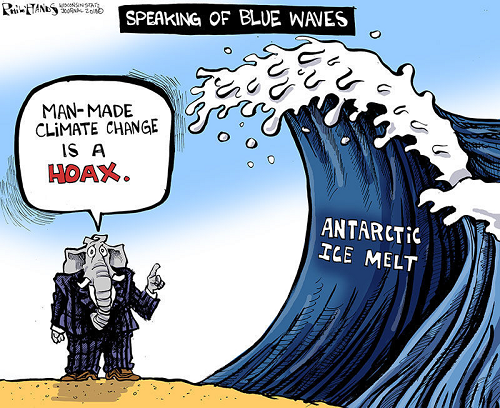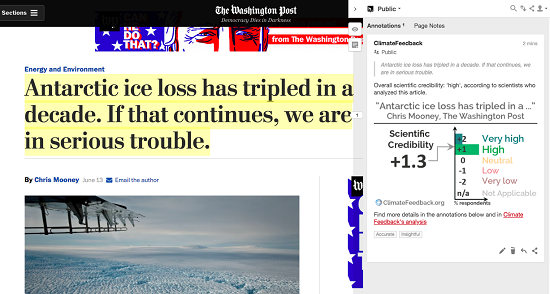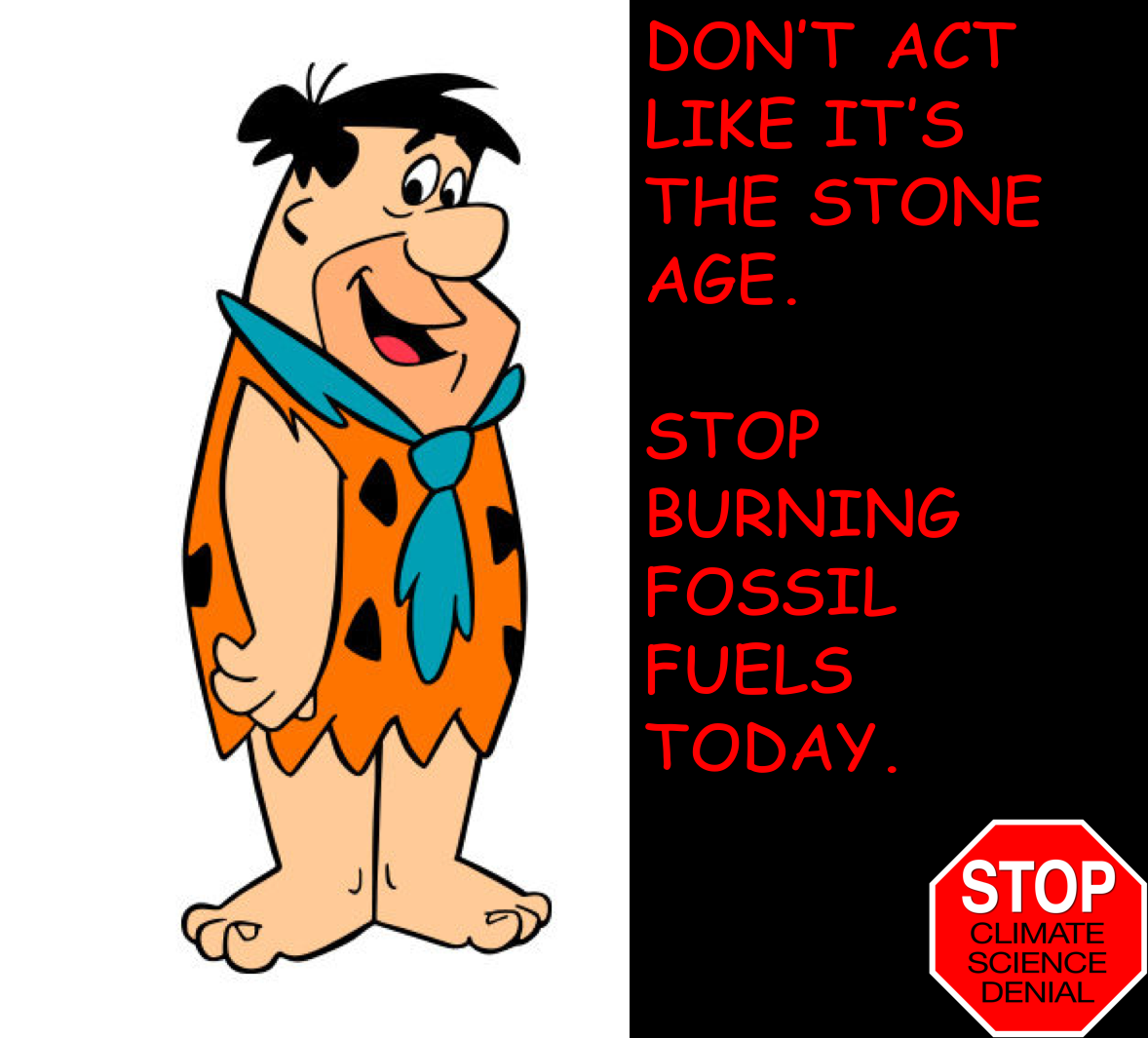Story of the Week... Editorial of the Week... El Niño/La Niña Update... Toon of the Week... Quote of the Week... Coming Soon on SkS... Climate Feedback Reviews... SkS Week in Review... Poster of the Week...
Story of the Week...
Uncovering the Mental Health Crisis of Climate Change

Source: Pexels
The young man believed he only had five years to live. “Not because he was sick,” said Kate Schapira, “not because anything was wrong with him, but because he believed that life on Earth would be impossible for humans.”
The sign on Schapira’s booth read: CLIMATE ANXIETY COUNSELING 5¢ THE DOCTOR IS IN. Time to earn her pennies.
On that muggy June day, she had set up shop in Kennedy Plaza in downtown Providence, Rhode Island. Schapira is not a trained therapist — a fact she makes clear to visitors — but she is happy to chat with anyone suffering from anxiety about climate change. “A lot of what I do is listen and ask questions,” she said.
Over the coming decades, rising temperatures will fuel natural disasters that are more deadly than any seen in human history, destabilizing nations and sending millions to their death. Experts say that we need to prepare for a hotter, less hospitable world by building sea walls, erecting desalination plants and engineering crops that can withstand punishing heat and drought, but few have considered the defenses we need to erect in our minds. Some, like Shapira, have called for more talking, more counseling to process our grief. But will that be enough? Climate change will do untold violence to life on this planet, and we have remarkably few tools to deal with its emotional cost.
Uncovering the Mental Health Crisis of Climate Change by Jeremy Deaton, Nexus Media, June 12, 2018
Editorial of the Week...
Big Oil CEOs needed a climate change reality check. The pope delivered

Good common sense speaks even more loudly when it comes from unexpected corners.’ Photograph: Andreas Solaro/AFP/Getty Images
You kind of expect popes to talk about spiritual stuff, kind of the way you expect chefs to discuss spices or tree surgeons to make small talk about overhanging limbs.
Which is why it was so interesting this week to hear Pope Francis break down the climate debate in very practical and very canny terms, displaying far more mathematical insight than your average world leader and far more strategic canniness than your average journalist. In fact, with a few deft sentences, he laid bare the hypocrisy that dominates much of the climate debate.
The occasion was the gathering of fossil fuel executives at the Vatican, one of a series of meetings to mark the third anniversary of Laudato Si, his majestic encyclical on global warming. The meetings were closed, but by all accounts big oil put forward its usual anodyne arguments: any energy transition must be slow, moving too fast to renewable energy would hurt the poor by raising prices, and so forth.
Big Oil CEOs needed a climate change reality check. The pope delivered, Opinion by Bill Mckibben, Comment is Free, Guardian, June 14, 2018
El Niño/La Niña Update...
Well, well, well… what have we here? Favorable conditions for El Niño to develop? The June ENSO forecast estimates a 50% chance of El Niño developing during the late summer or early autumn, and an approximately 65% chance of El Niño conditions in the winter, so forecasters have instituted an El Niño Watch.
June 2018 ENSO Update: El Niño Watch! by Emily Becker, NOAA's Climate.gov, June 14, 2018
Toon of the Week...

Quote of the Week...
Grayling’s Commons speech did not even mention climate change, yet this omission attracted negligible attention until Lucas tweeted her incredulous dismay – which, I suggest, tells us that most people now think one more runway will make no difference to climate change, but a massive difference to the UK economy. Might they be right? Lucas addresses her reply to the carpet between our chairs, like a pop star performing an old hit she can’t believe anyone could still need to hear again.
“If you measured impact on climate change by each individual action then you’d never be able to talk about the cumulative impact of a set of actions on the climate. We know aviation is one of the fastest growing sources of emissions; we know emissions at altitude are a lot more damaging to the climate than they are at ground level; we know that if Heathrow expands then it’s almost like an arms race between the different airports across Europe, because they’re all in a fight for passengers.”
But we keep being told we must not concede a competitive advantage to rival European airports. She counters wearily: “If you were talking to campaigners in Charles de Gaulle [airport in Paris], they’d tell you they’re told exactly the same thing: don’t concede defeat to London! We’re all being pitted against one another in this incredibly dangerous race to the bottom. If we were to follow the logic of those people who think every time we build a runway our economy miraculously benefits, then why would you not just cover the whole country in concrete? That’s the logic of that argument. The bottom lines is that aviation is a very good example of why you can’t say: ‘We’ll have a demand-led approach’ – because the demand will go on. I think there needs to be a mature conversation about limits to growth. I think we need to ask: growth for what?”
Growth for jobs? Growth for our kids to leave home and afford a mortgage and enjoy the living standards our parents took for granted? “Growth that is not tackling inequality,” she rejoins. “Growth that’s destroying the planet we depend on. Growth that we know, by simply measuring prosperity in terms of GDP growth, is an incredibly blunt instrument. GDP simply measures the circulation of money in the economy, not whether or not the outcome of using that money is positive or negative. A major pile up on the M5 is wonderful for growth, because it means people go out and buy more cars. But by any other measure of what’s useful or helpful, a pile up on the M5 is bad news.”
Caroline Lucas on Heathrow and climate change: ‘The apocalypse is happening’, Saturday Interview by Decca Aitkenhead, Guardian, June 16, 2018
Coming Soon on SkS...
- Should we be worried about surging Antarctic ice melt and sea level rise? (Dana)
- Wally Broeker: Father of “Global Warming”, in a Warning to his Granddaughter (greenman)
- Life after PhD (Climatesight Kate)
- Guest Post (John Abraham)
- New research this week (Ari)
- 2018 SkS Weekly Climate Change & Global Warming News Roundup #25 (John Hartz)
- 2018 SkS Weekly Climate Change & Global Warming Digest #25 (John Hartz)
Climate Feedback Reviews...
Washington Post article accurately describes latest estimate of accelerating Antarctic ice loss

Climate Feedback asked a team of scientists to review the article, Antarctic ice loss has tripled in a decade. If that continues we are in serious trouble. by Chris Mooney, Energy & Environment, Washington Post, June 13, 2018
Four scientists analyzed the article and estimate its overall scientific credibility to be 'high'.
A majority of reviewers tagged the article as: Accurate, Insightful
Review Summary
This article in The Washington Post describes an important study from a project called the Ice sheet Mass Balance Intercomparison Exercise (or IMBIE), which synthesized many existing records of Antarctic ice based on different types of measurements. The resulting estimate shows that Antarctica alone lost enough ice between 1992 and 2017 to raise global sea level by around 7.6 millimeters—almost 10% of the total sea level change over that time period.
Scientists who reviewed the article found that it accurately summarized this result, while explaining some of the processes behind this mass loss and the sea level rise it produces. However, they note that future trends depend partly on complex natural variability, which the article could have made clear.
Washington Post article accurately describes latest estimate of accelerating Antarctic ice loss, Edited by Scott Johnson, Climate Feedback, June 15, 2018
SkS Week in Review...
- 2018 SkS Weekly Climate Change & Global Warming News Roundup #24 by John Hartz
- New research, June 4-10, 2018 by Ari Jokimäki
- The legal fight to leave the dirtiest fossil fuels in the ground by John Abraham (Climate Consensus - the 97%, Environment, Guardian)
- 97% of Climate Scientists Really Do Agree by Guest Author (It's Okay To Be Smart with Joe Hanson)
- Benefits of curbing climate change far outweigh costs by Dana Nuccitelli (Bulletin of the Atomic Scientist)
- The Wall Street Journal keeps peddling Big Oil propaganda by Dana Nuccitelli (Climate Consensus - the 97%, Environment, Guardian)
- 2018 SkS Weekly Climate Change & Global Warming Digest #23 by John Hartz
Poster of the Week...

from Skeptical Science
via IFTTT